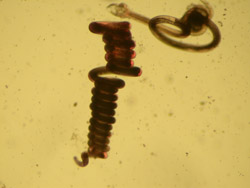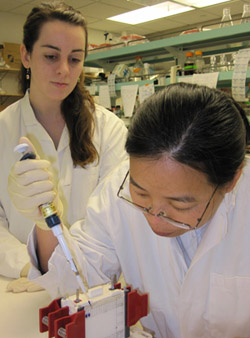Bt Protein Found Effective Against Parasitic Roundworm Infections
FEBRUARY 24, 2010
Media Contact: Kim McDonald (858) 534-7572

The researchers found that a protein from a soil bacterium is three times better at killing this intestinal parasitic roundworm in mice than the current best available treatment. At top right, the male parasite. At bottom, the female parasite.
Credit: Aroian Laboratory, UCSD
Biologists at UC San Diego have discovered that a protein from a soil bacterium used to kill insects naturally on organic crops is a highly effective treatment for intestinal parasitic roundworms. These parasites, which include hookworms and whipworms, infect about two billion people in underdeveloped tropical regions and are cumulatively one of the leading causes of debilitation worldwide.
The scientists report in the March 2 issue of the open-access journal PLoS Neglected Tropical Diseases, that a crystal protein known as Cry5B produced by the Bt, or Bacillus thuringiensis, bacterium is highly effective at a single dose at curing mammals of intestinal roundworm infections.
Bt is a bacterium famous for its use in agricultural insect control and is the leading biologically produced insecticide worldwide. Bt crystal proteins have been used as insecticides for over five decades and are known to be non-toxic to vertebrates.
The discovery of the crystal protein's effectiveness against parasites was made in a UCSD laboratory that has conducted pioneering studies of Bt crystal proteins such as Cry5B that kill roundworms, instead of insects.
Parasitic roundworms, are considered by public-health officials to have a combined debilitating impact on human populations that is comparable to, or in some estimates greater than, that of malaria or tuberculosis.
"More than two billion people are infected with these parasites worldwide," said Raffi Aroian, a professor of biology at UCSD who headed the research effort. "That's one and a half times the combined populations of North America, Europe and Russia."

Yan Hu, a postdoctoral fellow (at right), and Sophia Georghiou, a graduate student, performed most of the experiments in the study.
Credit: UCSD
"Intestinal roundworm diseases are among the most important causes of disease burden in school-aged children worldwide, leading to stunted growth, retarded cognitive and mental development and malnutrition. Children with these parasites are more likely to be trapped in poverty because of the major impact of disease on their lives. The parasites also have a significant burden on pregnant women and working adults."
But despite the huge impact of these parasites on the developing world, few drugs have been developed to effectively combat their infection in human populations. In fact, the drugs available now were mostly developed for use in veterinary medicine. Little effort has been put to directly solve and address the human intestinal roundworm problem.
"For practical reasons, only one drug, albendazole, is now widely used in administering single-dose treatments to large populations," Aroian added. "But because of the enormous numbers of people that need to be treated repeatedly, the development of resistance to albendazole is a serious threat and is already suspected in two studies in Sri Lanka and Ethiopia. Furthermore, albendazole, as part of mass drug administrations, is a far from ideal drug, having poor impact on whipworms and incomplete impact on hookworms. A recent talk at the Society for Tropical Medicine and Hygiene annual meeting highlighted the inadequacies of albendazole in treating roundworms in South America."
The latest drug to be developed is tribendimidine, which clinically appears to be similar to albendazole, Aroian said.
But Aroian and his colleagues found in their head-to-head study of tribendimidine against an intestinal parasitic worm in mice that the Cry5B protein is three times better than tribendimidine.
"Comparisons in the literature with the other anti-worm drugs against this same mouse parasite, Heligmosomoides bakeri, indicate that Cry5B is anywhere from 4 times to 10,000 times more effective than various other anti-worm drugs," said Aroian.
"Furthermore, we found in our study that most of the Cry5B is likely degraded in the stomach, so if we can protect this protein from stomach degradation, it is likely to be an even more powerful drug against parasites than we are currently measuring," he said.
"The bottom line is that this natural soil bacterium has evolved a way of killing intestinal roundworms that is better than any drug we currently have available," Aroian said. "Our results pave the way to developing Cry5B as a safe and superior drug against roundworms that can rid a terrible class of parasites from hundreds of millions of children around the world. We are one step closer to finding a more complete treatment. Why this bacterium has evolved such a powerful anti-roundworm protein is because it is likely that roundworms and Bt interact in the wild, engaged in a sort of natural warfare with each other. If so, then the old adage 'the enemy of my enemy is my friend' may turn to our advantage here."
Yan Hu, a postdoctoral fellow in Aroian's laboratory, and Sophia Georghiou, a graduate student, performed most of the experiments in the study along with Alan Kelleher, a staff scientist in Aroian's laboratory.
The researchers were supported by grants from the National Institute of Allergy and Infectious Diseases, a part of the National Institutes of Health.
In addition, two patents have been filed by UC San Diego on inventions related to the study. The specific inventions are available for licensing or commercial development through UCSD's Office of Innovation and Commercialization.
